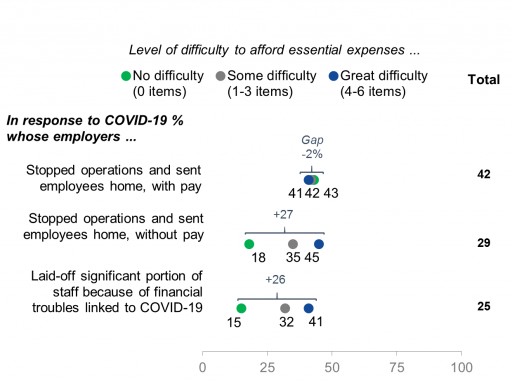
ROCKVILLE, Md. - April 17, 2020 - (Newswire.com)
In a survey conducted from March 23-31, EurekaFacts evaluated the attitudes and experiences during the early part of the coronavirus pandemic based on levels of financial security. Americans are categorized into one of three groups (no difficulty, some difficulty, or great difficulty) based on their answers to questions about the level of difficulty affording their expenses, including food, housing, health care, utilities, transportation, and childcare.
In the workplace, financially vulnerable Americans are most impacted by the COVID-19 pandemic
- Close to half (45%) of American workers who have great difficulty affording basic expenses say that their workplace has stopped operations and sent employees home without pay, compared with just 18% of those who report no difficulty affording their core expenses.
- Another 41% of the most financially distressed Americans say that their employers have laid-off large portions of staff due to financial troubles linked to COVID-19, while only 15% of those without difficulty affording basic expenses report widespread lay-offs in their workplace.
Most financially distressed workers have been granted flexible leave by their employers to stay home if they are sick
- When it comes to creating flexible workplace leave policies during the pandemic that make it easier for the sick to stay home, a majority (58%) of the most financially distressed workers have been granted this flexibility by their employers, which is on par with two-thirds (66%) of workers who report no difficulty affording their essential needs.
- Slightly more of those who face great financial stress say that their employer has instituted a back-up system that would allow other workers to cover the work of sick or quarantined staff members in their workplace than among American workers who have no difficulty with basic expenses (45% vs. 39%).
How financially stressed Americans view the impact of COVID-19 on themselves and their communities
- Americans who face great difficulty affording their basic expenses are far more likely than their more well-off counterparts to be “very concerned” about the impact of COVID-19 on their local economy (73% vs. 55%) and on their place of work (66% vs. 37%).
- The most financially insecure Americans compared with Americans who say they have no difficulty affording core expenses are “very concerned” about the ability of their local hospitals and clinics to care for the sick (69% vs. 55%) and their personal health (64% vs. 39%).
Visit EurekaFacts.com/COVID19 for additional survey results. Sample sizes and sampling errors for overall results and subgroups available upon request. For more information about this study, please contact Research Director Robert Suls at sulsr@eurekafacts.com.
Source: EurekaFacts Panel Survey of U.S. adults, March 23-31, 2020. N=936. Conducted in compliance with ISO: 20252 to which EurekaFacts is certified.
Press Release Service by Newswire.com
Original Source: COVID-19 Workplace Challenges for Financially Insecure Workers, According to EurekaFacts Survey

